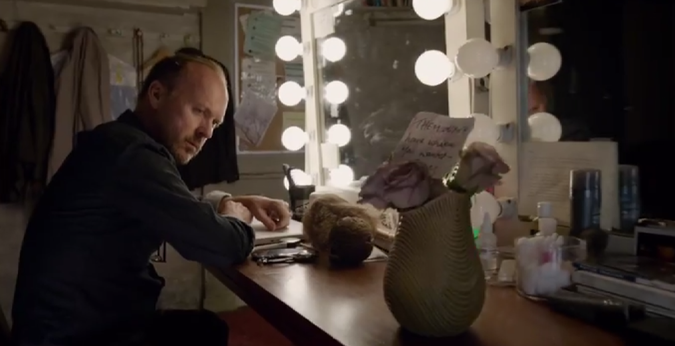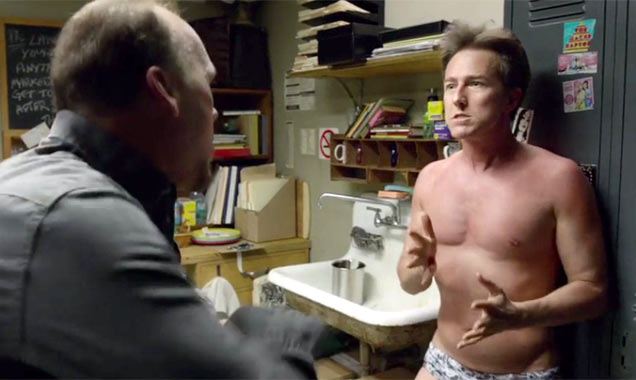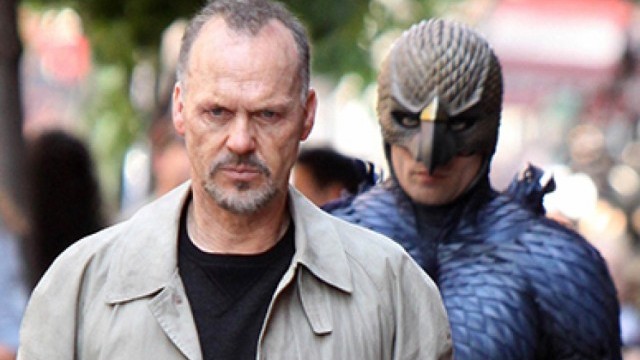The premise of Birdman is such that autobiographical suppositions are pretty unavoidable. Michael Keaton plays washed up movie star Riggan Thomson, an actor most known for playing the superhero Birdman. He’s trying to mount a Raymond Carver adaptation on Broadway he penned himself (and is starring in, and directing, natch) to fight the presumption that he’s a has been. The parallels are pretty obvious, and, if you love Michael Keaton like I do, a Charlie Kaufman-esque mindfuck about his life would be more than worth the price of admission, but thankfully, Alejandro González Iñárritu has something much more bountiful up his sleeve.
Birdman sidesteps the inside baseball stigma of most behind the scenes films by transcending being a story about fame or Hollywood. Rather, it functions as a sobering meditation on the destructive double-edged sword of validation. It captures the world of acting and the inherent stress of putting on a show by cleverly stitching together a series of long takes to imply an entire two hour film that feels like one shot. At first this choice seems a little distracting, as you find yourself looking for the seams and hidden cuts (which, to be fair, aren’t exactly hidden that hard) but as the film progresses, it’s clear that technical achievement, while impressive, isn’t the point of the project.
Iñárritu uses the craft of acting and the art of putting on a show as a conduit to explore the sometimes toxic need to be adored. At times, it leans a little too hard into faux relevance (as does any film made by someone over 40 who is too concerned with “likes” and “retweets” ruining society), but with an insanely talented cast all performing at the peak of their powers, the sometimes spotty material (from a script written by four people) is elevated to an elite level. Keaton takes the cake as Riggan, an innately likable performer who is just a hair less talented than he wishes he was and thrives (and withers) based on the admiration of others. The film mostly lingers around his point of view, finding both humor and weakness in his solitary moments, surreal bits of cinema where he levitates, exercises telekinesis and is endlessly haunted by a gravelly Christian Bale-esque Birdman voice that won’t stop reminding him how far he’s fallen.
Keaton has always been an actor with a lot of range but whose specialty (a singularly intense and off-kilter sense of comic and dramatic timing) has sort of pigeonholed him. That and the whole playing Batman thing. There’s something genuine and yearning about the way he is presented here that makes you feel like the role is an exorcism for the actor, but the notion that makes you feel Keaton is just playing a variation of himself is the very same reductive reasoning that hounds Riggan in the film. He wants so desperately to be seen at his full potential, but his entire world exists in the chasm between that ideal and his reality.
The self awareness doesn’t stop there. Arguably the real scene stealer here is Edward Norton as Mike Shiner, a difficult, confounding performer who frustrates his peers, is controlling of material, and can be a real prick, not unlike every backstage story about Norton himself. He’s a delight in all of his scenes and makes a perfect counterpoint to Keaton in every way. Their chemistry is palpable, whether in their hilarious fight scene or the act of picking apart Riggan’s script. Watching these two incredible actors ACTING as two incredible actors acting together is a blast, and seldom has the theatrical been so well staged cinematically. Zach Galifinakis is better than he’s ever been as Riggan’s best friend/producer/lawyer, a far cry from his usual Tim & Eric-y bullshit.
The trio of women in Riggan’s life (Andrea Riseborough as his girlfriend, Amy Ryan as his ex-wife, and Emma Stone as his daughter) are all top notch. They each feel like real lived-in characters and not just feminine set dressing. Naomi Watts is solid, too, but none of her moments stand out quite as strongly as Ryan’s subtle disappointment, Riseborough’s peculiar warmth, or Stone’s exquisite expression of rage at her distant, clueless father. Each of them love Riggan in different ways, but none of them enough to sate the bottomless pit of his need, that hideous hunger for constant validation. Even his adversarial relationship with Tabitha (a theater journalist played with elan by Lindsay Duncan) is an extension of the war between Riggan and the masses he wants to prove himself to.
The marriage between these rich, engrossing performances and Emmanuel Lubezki’s patient, observant cinematography makes this film a special one. Even though every scene feels like a camera following the same few people around the same location, it moves with a deft wit, creating new shots within the bravura sweep of the frame. Long takes can become stagnant, but here, the sharp use of mirrors and reflective surfaces replace the effect of intercutting, with the architecture of the theater aiding in creating new compositions to keep the scenes fresh and inventive. The effect caused by the camera work, like you literally live inside this theater and every room is connected like an Aaron Sorkin walk and talk lives next door, immerses you into this taxing, daunting world.
The slog of it all, the sleeplessness, hangs over the proceedings. Why do people need to give up this much of themselves just to put on a show? Norton’s character does it for the supposed need for truth. Watts’ Lesley is living out her childhood dream of being on Broadway. Riggan needs to prove himself worthy of critical consideration. You may find that odd, but how many of you have ever sat in a booth at Panera obsessively trying to streamline a topical joke down to 140 characters in hopes for a little post-lunch pat on the back? Ever post an unconventionally daring selfie only to delete and repost it when you see more people online who might push that little red heart button and positively reinforce your existence?
There’s a reason the voice that torments Riggan is a self-important superhero who tells him he deserves more than he has. In today’s world of constant self-mythologizing, living in public allows us to each be our own superhero. You’re always looking to reach a new high of validation and it never quite feels like enough. Riggan tries so hard to relive those glory days that he completely glosses over the singular validation of his loved ones. The film’s questionably executed finale reconciles this struggle with a fair amount of ambiguity that left me a little cold, but there’s no arguing that Birdman‘s final image is a powerful one.
Birdman is out now in limited release.





